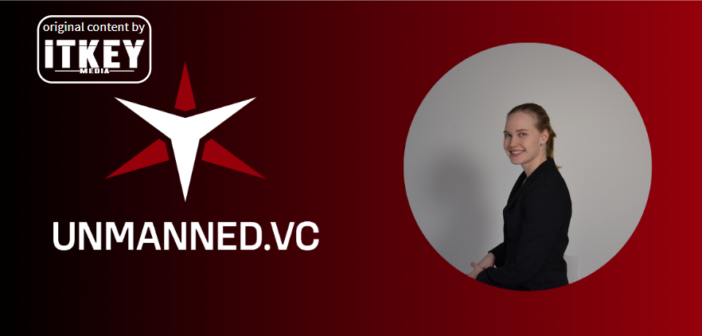- Unmanned.vc is the Baltics’ new VC firm investing in early-stage unmanned and autonomous systems startups
- Backed by defense experts, AI specialists, and UAV industry leaders, the fund offers strategic expertise and partnerships
- The team focuses on Estonia and NATO-aligned countries, investing EUR 50K–300K per startup
- Unmanned.vc’s great advantage is its expert assistance in navigating complex regulations while fostering dual-use tech for defense and civilian applications
Launched in March, Unmanned.vc is a new Estonian venture capital firm. It will invest in early-stage, high-growth companies focused on unmanned systems. The fund aims to acquire minority stakes in startups specializing in autonomous systems and related fields such as AI, robotics, space technology, and cybersecurity, fostering innovation in next-generation autonomous technologies.
The fund is managed by Meri Heikkinen and advised by Ellis Timon Huber and Josh Henriques of 2Raw Aerials, Elias Silvola of Modirum | Gespi, Jari Heikkinen of Modirum, and Tero Silvola of BC Platforms. With an initial fund size of EUR 2M, Unmanned.vc will invest between EUR 50K and EUR 300K per company, with a primary focus on Estonia.
In addition to funding, the firm provides strategic support through key industry partnerships. Its collaboration with Modirum | Gespi offers expert defense consulting, while its technical advisors from 2Raw Aerials provide specialized insights into UAV design and engineering. To enhance supply chain security, the firm has also partnered with an emerging UAV component manufacturer, ensuring cost-efficient and resilient supply chains for its portfolio companies.
By combining financial investment with deep industry expertise, Unmanned.vc aims to foster innovation and support the growth of pioneering companies in the unmanned systems sector. Its mission is to accelerate the development of cutting-edge autonomous technologies that will shape the future.
ITKeyMedia approached Unmanned.vc’s fund manager Meri Heikkinen and member of the advisory board Elias Silvola to ask about the new fund, the peculiarities of investing in unmanned technologies, the avionics landscape of the region, and more.
What is the background of the founding partners? Was there any particular trigger that inspired them that a fund like Unmanned.vc was needed and convinced them that they were the right people for the job?

Meri Heikkinen, Fund Manager at Unmanned.vc
Meri Keikkinen: The founding partners and advisors possess extensive expertise in unmanned aerial vehicles, the defense sector, and the startup ecosystem, providing an ideal foundation for supporting startups in the unmanned systems sector.
We see the broader trend in autonomous systems development as a key driver behind the launch of unmanned VC. The combination of artificial intelligence and the latest advancement in robotics is accelerating technological progress across various sectors, including logistics and defense.
What are the peculiarities of investing in companies developing unmanned systems?
MH: Many unmanned systems have civilian, dual-use, and military applications, leading to complex regulatory considerations. Navigating these varying regulations requires careful attention to compliance and strategic planning. The unmanned systems market is rapidly evolving, with increased adoption across sectors such as logistics, agriculture, and defense. This growth necessitates that startups remain agile and responsive to shifting market demands and competitive landscapes.
Unmanned systems often require the integration of diverse technologies, including artificial intelligence, advanced electronics, and aeronautics. This complexity demands substantial research and development investments and access to specialized expertise. Early-stage companies frequently tackle multiple facets of unmanned systems simultaneously—such as hardware development, AI algorithm design, and sensor integration. Focusing on scalable business models and streamlining product development processes are essential for successful commercialization.
How does Unmanned.vc differentiate itself from other VC funds investing in deep tech and autonomous systems?
Elias Silvola: Unmanned.vc differentiates itself through a uniquely close integration with operational defence programs, enabling us to offer startups access to advanced validation environments including electronic warfare simulation, RF spectrum stress testing, and other demanding real-world scenarios. This allows emerging technologies to be tested and refined in the most challenging conditions, often in collaboration with existing end-users.
Our team brings deep technical expertise across electronics—including board design and software-defined radios, aeronautics, command-and-control architectures, and AI-driven solutions for autonomous swarming and GNSS-denied navigation. This technical depth helps us not only evaluate complex technologies but also actively support their maturation and path to deployment.
Unmanned.vc is investing in technologies that initially deliver critical capabilities to defence, but which we believe will ultimately redefine broader civilian markets, as autonomy, resilience, and distributed intelligence will be central to both.
It was mentioned that the fund’s primary regional focus would be Estonia. Can you say that Estonia’s tech ecosystem particularly excels in unmanned systems among other countries in the region?
MH: Estonia has a thriving startup ecosystem, which supports deep tech innovation and autonomous systems development. In the defense and dual-use sector, Estonia is particularly strong. The country has close ties with NATO and the European defense ecosystem, making it a strategic location for startups developing unmanned aerial, ground, and maritime systems. Several successful startups in the autonomous systems landscape such as Starship Technologies have already emerged from Estonia.
Are you open to investing globally?

Elias Silvola, President and CEO at Modirum | Gespi, Member of the Advisory Board at Unmanned.vc
ES: Unmanned.vc primarily focuses on investments within NATO countries in Europe, with selective exposure to NATO-friendly states where alignment on security, compliance, and operational standards is strong. This geographic focus enables us to invest within a trusted ecosystem that supports interoperability, technology sharing, and a high degree of regulatory and strategic alignment.
Operating under the NATO umbrella offers significant advantages to early-stage companies, including clearer pathways to procurement, access to shared testing and certification frameworks, and increased credibility when entering both defence and dual-use markets. By investing in this environment, we help ensure that emerging technologies are not only innovative but also aligned with the operational and security standards of some of the world’s most advanced defence and industrial systems.
Overall, how do you see the European regulatory landscape affecting investments in autonomous technologies and dual-use innovations?
MH: Europe lags behind the U.S. in deploying autonomous systems due to stricter regulations and slower approvals. For example, Zipline’s drone deliveries in the U.S. would face significant regulatory hurdles in Europe. Cross-border regulatory fragmentation also makes scaling complex.
However, defense-related autonomy is gaining traction, with increased funding from the European Defence Fund (EDF) and national initiatives. While cautious regulations slow commercial adoption, Europe’s focus on trusted, ethical AI and robotics presents long-term opportunities for startups aligning with evolving policies.
Is there any time frame as to when we might expect Unmanned.vc to announce its first investments?
MH: We are actively engaged in negotiations for our initial investments and anticipate finalizing the first deal in the near future.
Tallinn-based Unmanned.vc enters the market with a clear vision to support the next generation of autonomous technologies through strategic investments and industry expertise. With a strong foundation in defense and deep tech, the fund positions itself to help startups navigate regulatory challenges and scale their innovations. As it prepares to announce its first investments, Unmanned.vc has every chance to play a pivotal role in shaping the future of autonomous systems in Estonia, CEE, and beyond.

Kostiantyn is a freelance writer from Crimea but based in Lviv. He loves writing about IT and high tech because those topics are always upbeat and he’s an inherent optimist!




